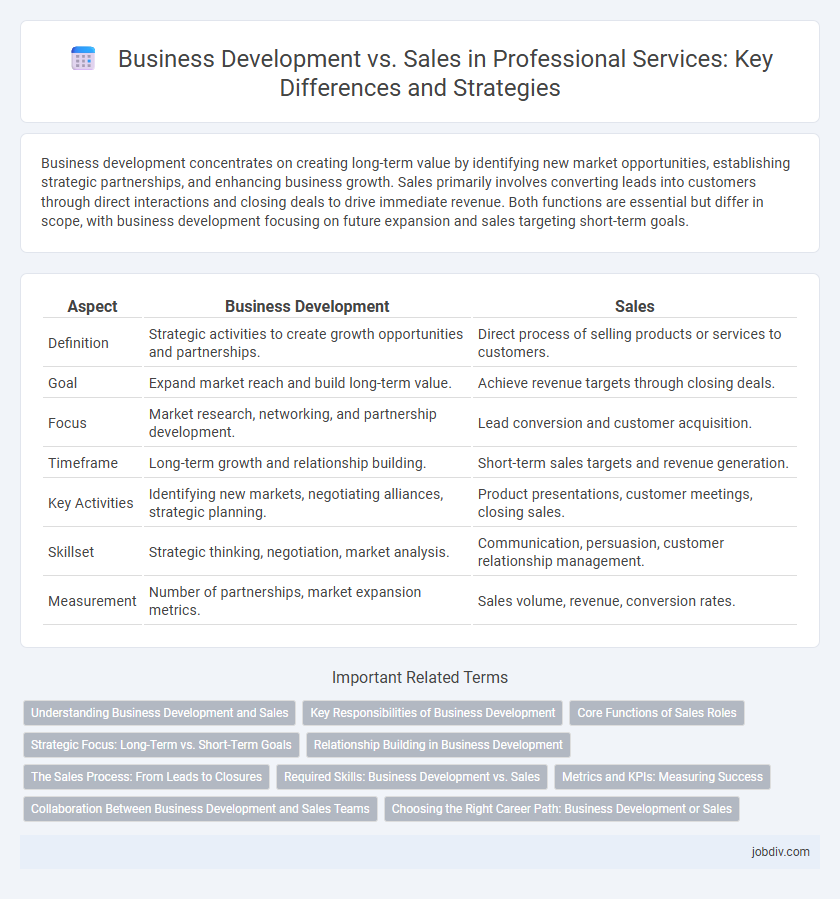Business development concentrates on creating long-term value by identifying new market opportunities, establishing strategic partnerships, and enhancing business growth. Sales primarily involves converting leads into customers through direct interactions and closing deals to drive immediate revenue. Both functions are essential but differ in scope, with business development focusing on future expansion and sales targeting short-term goals.
Table of Comparison
| Aspect | Business Development | Sales |
|---|---|---|
| Definition | Strategic activities to create growth opportunities and partnerships. | Direct process of selling products or services to customers. |
| Goal | Expand market reach and build long-term value. | Achieve revenue targets through closing deals. |
| Focus | Market research, networking, and partnership development. | Lead conversion and customer acquisition. |
| Timeframe | Long-term growth and relationship building. | Short-term sales targets and revenue generation. |
| Key Activities | Identifying new markets, negotiating alliances, strategic planning. | Product presentations, customer meetings, closing sales. |
| Skillset | Strategic thinking, negotiation, market analysis. | Communication, persuasion, customer relationship management. |
| Measurement | Number of partnerships, market expansion metrics. | Sales volume, revenue, conversion rates. |
Understanding Business Development and Sales
Business development focuses on identifying new market opportunities, building strategic partnerships, and fostering long-term growth, whereas sales concentrate on closing deals and generating immediate revenue. Business development involves research, relationship management, and market analysis to fuel sustainable expansion. Sales teams translate these strategies into actionable client engagements and revenue generation through direct product or service transactions.
Key Responsibilities of Business Development
Business development focuses on identifying growth opportunities, building strategic partnerships, and expanding market reach to drive long-term company success. It involves market research, lead generation, and relationship management to create new revenue streams beyond immediate sales transactions. Key responsibilities include analyzing industry trends, negotiating business deals, and fostering collaborations that align with overall corporate objectives.
Core Functions of Sales Roles
Sales roles primarily focus on executing strategies to convert leads into customers through direct client interactions, negotiation, and closing deals. Core functions include prospecting new clients, managing customer relationships, and meeting predefined sales targets to drive revenue growth. These responsibilities ensure consistent market expansion by maintaining a robust sales pipeline and fostering customer loyalty.
Strategic Focus: Long-Term vs. Short-Term Goals
Business development prioritizes long-term growth by identifying new market opportunities, fostering partnerships, and developing sustainable strategies aligned with company vision. Sales concentrate on short-term goals by targeting immediate revenue generation, closing deals, and meeting quarterly targets. This strategic focus distinction shapes how organizations allocate resources and build customer relationships for sustained success.
Relationship Building in Business Development
Business development emphasizes long-term relationship building by identifying and nurturing strategic partnerships that drive sustainable growth. This approach focuses on understanding client needs and creating value beyond individual transactions, differentiating it from sales, which targets closing deals and achieving short-term revenue goals. Effective business development cultivates trust and mutual benefit, laying the groundwork for ongoing collaboration and business expansion.
The Sales Process: From Leads to Closures
The sales process begins with lead generation, where potential clients are identified through targeted marketing strategies and market research. Effective qualification and nurturing of these leads involve personalized communication and value-driven engagement to build trust and address client needs. The process culminates in closing deals by negotiating terms, overcoming objections, and securing commitments that convert prospects into loyal customers.
Required Skills: Business Development vs. Sales
Business development requires strategic thinking, market research, relationship building, and the ability to identify new business opportunities to enhance long-term growth. Sales focuses on communication, negotiation, product knowledge, and closing deals to meet immediate revenue targets. Mastery in both areas demands strong interpersonal skills and an understanding of customer needs, but business development emphasizes strategic planning while sales prioritize execution and persuasion.
Metrics and KPIs: Measuring Success
Business Development success is measured through metrics such as partnership growth rate, market expansion, and lead generation quality, which indicate long-term strategic impact. Sales performance relies heavily on KPIs like conversion rate, average deal size, and sales cycle length to assess revenue generation efficiency. Comparing these metrics helps organizations balance immediate revenue goals with sustainable business growth objectives.
Collaboration Between Business Development and Sales Teams
Business development and sales teams collaborate closely to drive revenue growth and expand market reach. Business development identifies new market opportunities and nurtures strategic partnerships, while sales focus on converting leads into customers and closing deals. Effective communication and aligned goals between both teams enhance customer acquisition, increase sales efficiency, and sustain long-term business success.
Choosing the Right Career Path: Business Development or Sales
Choosing between business development and sales depends on your strengths and career goals; business development focuses on strategic partnerships and long-term growth, while sales emphasizes closing deals and meeting revenue targets. Business development professionals engage in market research, networking, and relationship-building to create new opportunities, whereas sales teams concentrate on product knowledge and client interactions to drive immediate results. Understanding these distinct roles helps professionals align their skills with career paths that offer growth, job satisfaction, and impact within organizations.
Business Development vs Sales Infographic

 jobdiv.com
jobdiv.com